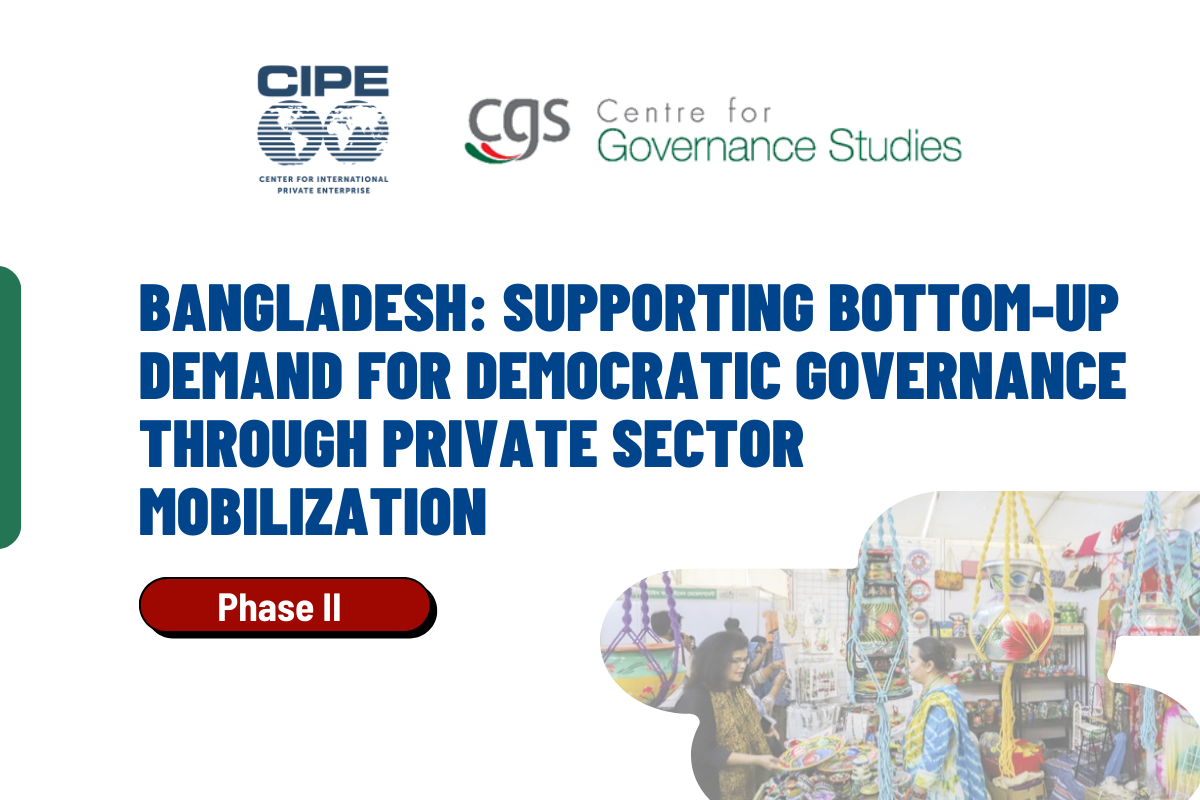Bangladesh: Supporting Bottom-Up Demand for Democratic Governance Through Private Sector Mobilization - Phase II
01 April 2024
Project Partner: Centre for International Private Enterprise (CIPE)
Project Timeline: April 1, 2024- March 31, 2026
About the Project:
The primary goal of this project is to address systemic corruption in Bangladesh’s Small and Medium Enterprises (SME) sector by fostering collaboration among stakeholders by creating a new collective pressure group called the Forum for Fair Business and then engaging with the government to make changes in regulatory and institutional environments to address corruption issues. The proposed project builds on the project’s first phase, which took place between 01 February 2021 and 31 April 2023 and allowed CGS to collect evidence about the pervasiveness of corruption and the issues encountered by SMEs. According to the findings of the first phase, there is a lack of a platform and a Modus Operandi for SMEs to combat corruption inside the SME sector and its contacts with the public sector, particularly with the government. A multi-phase effort to counteract corruption often takes either an inward-looking or an outward-looking approach. The inward-looking approach entails, among other things, constructing procedures inside the private sector, forming transparency and integrity pacts, and recognizing change agents. The outward-looking strategy mobilizes a group of businesses from the private sector to engage with the government at both the national and sub-national levels, notably divisional and district governments. There are examples of both becoming successful. However, the project’s planned second phase proposes combining these two features in light of Bangladesh’s ground reality.
Objectives
Phase 2 of this project has two objectives in addressing the corruption issues –
1. Creating an SME platform for working collectively and offering tools and training to SME entrepreneurs to identify corrupt practices and improve internal governance to help them address these illicit practices.
2. Equip the entrepreneurs to influence the large national trade bodies in developing mechanisms to deter corrupt practices and lobbying the government to improve anti-corruption efforts, including reforming the existing laws and practices.
These objectives have been developed based on various activities of Phase 1 of the project. The SME assessment report prepared during Phase 1 noted that despite the fact that internal governance is one of the key issues for the sustainable growth of SMEs, ‘most of the small, cottage, and micro enterprises in Bangladesh lack governance documents such as formal registrations, licenses, and taxpayer identification numbers (TIN), among others. Without proper documentation and governance, many SMEs lack access to government programs and incentives that could facilitate growth. To improve this access and build more opportunities for continual growth, SME entrepreneurs should collate a set of principles and tools for governing SME activities that will support their competitive survival. It was also found in the assessment report, SME survey, the FGDs, and the CAAC Conference, which resulted in the Joint Declaration, that there are legal and institutional measures and an absence of accountability mechanisms which are contributing to the corrupt practices, especially demand-side corruption like people in power and various other offices demanding bribes. Over the long term, CGS will aim to make these transparency pacts more binding and turn into a seal of approval for the partaking SMES, which qualifies the businesses adopting these pacts as committed to avoiding bribes and corrupt practices.
Project Outcomes:
- Advisory Board Inception Meeting
- Rajshahi Workshop on January 12, 2025
- Khulna Workshop on January 19, 2025
